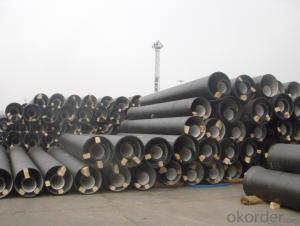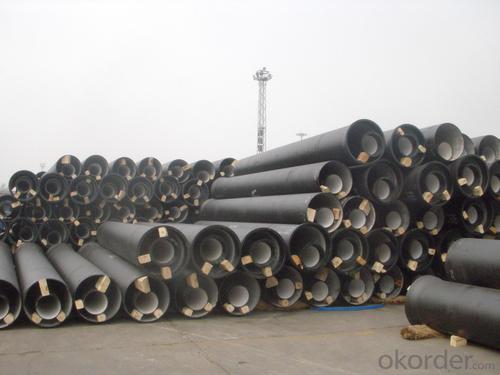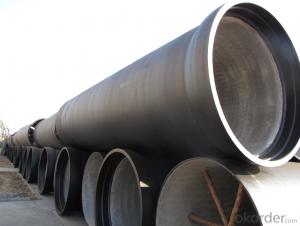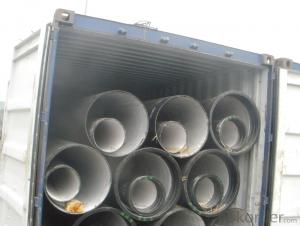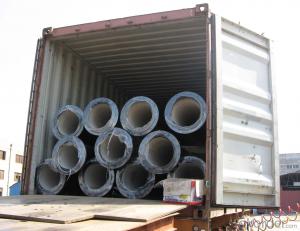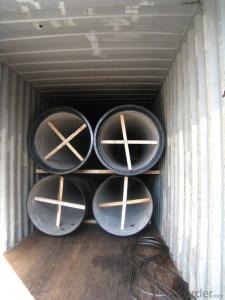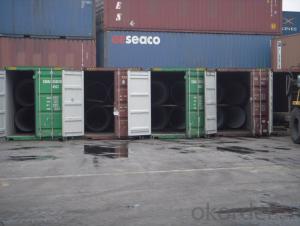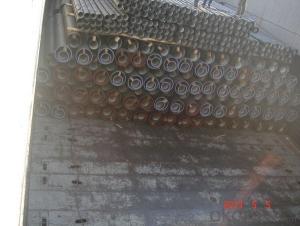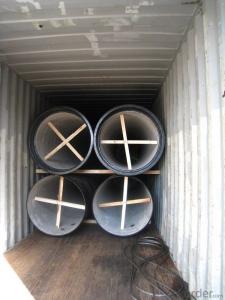DUCTILE IRON PIPE AND PIPE FITTINGS C CLASS DN1200
- Loading Port:
- Tianjin
- Payment Terms:
- TT OR LC
- Min Order Qty:
- 33 pc
- Supply Capability:
- 3000 pc/month
OKorder Service Pledge
OKorder Financial Service
You Might Also Like
· Material : Ductile Cast Iron
· Size Range : DN 80mm to DN 2000mm
· Unit Effective Length : 6m or 5.7m
· Manufacture Standard: ISO 2531:1998/ EN 545:2006/EN 598:2007
· Annual capacity : 200,000 tons
· Coating Exterior: Zinc 130g/m2 according to ISO 8179-1 and bitumen coating 70 microns.
· Cement Interior: Portland Cement/ High Alumina Cement/ Sulphate Resisting Cement Lining according to ISO 4179
· Special requirements on external coating and internal lining can be applied
· We also provide accessories such as SBR/EPDM rubber gaskets, lubricant paste, pipe caps, PE sleeves, etc.
Additional Parts:
Each pipe is strictly inspected according to related standard to ensure permanently high performance.
Easy Installation at site and service free for life
Long Service Lifespan
Quotation will arrive you within 24hours once we get your inquiry.
We guarantee offering you a competitive price.
A copy of original inspection reports of pipes will be offered after shipment.
Photos of loading process will be sent to the customer after shipment effect.
We will follow-up the delivery progress after shipment effect and update to the customer on weekly basis.
- Q: Can ductile iron pipes be used for pressure reducing stations?
- Yes, ductile iron pipes can be used for pressure reducing stations. Ductile iron pipes have high strength and durability, making them suitable for handling high-pressure systems. Additionally, their corrosion resistance properties make them a reliable choice for long-term use in pressure reducing stations.
- Q: Can ductile iron pipes be used for irrigation of sports fields?
- Yes, ductile iron pipes can be used for irrigation of sports fields. Ductile iron pipes are known for their durability, strength, and corrosion resistance, making them suitable for various applications, including irrigation. They can effectively transport water over long distances and withstand the pressure required for irrigation systems. Additionally, ductile iron pipes have a long lifespan, reducing the need for frequent replacements and ensuring reliable irrigation for sports fields.
- Q: What are the typical lengths of ductile iron pipes?
- The typical lengths of ductile iron pipes can vary depending on the specific project requirements and industry standards. However, commonly used lengths for ductile iron pipes range from 18 feet (5.5 meters) to 20 feet (6 meters). These lengths are suitable for various applications such as water distribution, wastewater systems, and industrial pipelines. It is important to note that custom lengths can also be manufactured to meet specific project needs.
- Q: Can ductile iron pipes be used for large-scale irrigation systems?
- Ductile iron pipes are ideal for large-scale irrigation systems due to their strength, durability, and corrosion resistance. They can withstand high pressure and meet the demands of extensive irrigation. Furthermore, these pipes have a long lifespan, minimizing the need for frequent maintenance and replacements. In addition, they are cost-effective when compared to alternative materials used in irrigation systems. Consequently, ductile iron pipes are a prudent choice for large-scale irrigation systems, given their strength, durability, corrosion resistance, and cost-effectiveness.
- Q: How does ductile iron pipe perform in areas with high soil consolidation?
- Ductile iron pipe performs exceptionally well in areas with high soil consolidation. The inherent strength and flexibility of ductile iron make it a suitable choice for underground installations where the soil tends to consolidate, or settle, over time. In areas with high soil consolidation, the ground often experiences significant movement and settling, which can pose challenges for buried infrastructure. However, ductile iron pipe's unique characteristics enable it to withstand these conditions. Firstly, ductile iron has a high tensile strength, which means it can resist external forces and pressures exerted by the surrounding soil. This strength allows the pipe to maintain its structural integrity even in areas with high soil consolidation. Secondly, ductile iron is highly resistant to deformation and can handle ground movement without cracking or breaking. The pipe's flexibility allows it to absorb the lateral forces associated with soil consolidation and prevents it from being damaged. Additionally, ductile iron pipe is known for its durability and long service life. It is resistant to corrosion, abrasion, and chemical attacks, further enhancing its performance in areas with high soil consolidation. This resistance ensures that the pipe remains intact and functional, even in challenging soil conditions. Moreover, ductile iron pipe's joints are designed to provide a secure and leak-free connection. This eliminates the risk of soil infiltration, which can potentially worsen soil consolidation and lead to further ground movement. In summary, ductile iron pipe performs exceptionally well in areas with high soil consolidation due to its strength, flexibility, durability, and leak-free joints. Its ability to withstand ground movement and maintain its structural integrity makes it a reliable option for underground installations in such conditions.
- Q: Can ductile iron pipes be used in contaminated soil conditions?
- Yes, ductile iron pipes can be used in contaminated soil conditions. Ductile iron is known for its strength, durability, and corrosion resistance, making it suitable for various soil conditions, including those contaminated with chemicals or other pollutants. The material's resistance to corrosion ensures that the pipes can withstand the harsh conditions and maintain their structural integrity over time. However, it is important to consider the type and level of contamination in the soil and consult with experts to determine if any additional protective measures or coatings are required to ensure the long-term performance of the pipes.
- Q: What is the expected flow capacity of ductile iron pipes?
- The expected flow capacity of ductile iron pipes can vary depending on several factors such as the diameter and wall thickness of the pipe, the type of fluid being transported, and the specific design and condition of the pipeline system. Generally, ductile iron pipes are known for their high flow capacity due to their smooth internal surface which minimizes frictional losses. They are designed to handle a wide range of fluid flows, including water, sewage, and industrial fluids. In terms of specific flow rates, it is common to refer to the Manning's equation, which is widely used to calculate the flow capacity of open channels and pipes. This equation takes into account the hydraulic radius, slope of the pipe, and Manning's roughness coefficient to determine the expected flow capacity. However, it is important to note that the actual flow capacity can also be influenced by other factors such as the presence of fittings, valves, and bends in the pipeline, as well as any potential blockages or obstructions. Therefore, it is recommended to consult the manufacturer's specifications, engineering guidelines, or work with a qualified engineer to accurately determine the expected flow capacity of ductile iron pipes for a particular application.
- Q: Can ductile iron pipes be used for underground hydropower systems?
- Indeed, underground hydropower systems can utilize ductile iron pipes. Renowned for their robustness and endurance, ductile iron pipes are apt for a wide range of purposes, including subterranean installations. With remarkable resistance against corrosion and the ability to withstand intense pressure, they are exceptionally suited for transporting water in hydropower systems. Furthermore, ductile iron pipes boast a lengthy lifespan, diminishing the necessity for frequent replacements and reducing maintenance expenses. Moreover, they exhibit excellent joint integrity, guaranteeing leak-free connections beneath the surface. Thus, ductile iron pipes emerge as a dependable option for underground hydropower systems.
- Q: How do ductile iron pipes perform in freeze-thaw cycles?
- Ductile iron pipes perform well in freeze-thaw cycles due to their high tensile strength and flexibility. Unlike brittle materials, ductile iron can withstand the expansion and contraction caused by freezing and thawing without cracking or breaking. This makes them a reliable choice for water and sewer systems in regions with harsh winter climates.
- Q: Can ductile iron pipes be used for marine applications?
- Ductile iron pipes are indeed applicable for marine uses. Renowned for its robustness and durability, ductile iron proves itself suitable for diverse settings, even marine environments. Its remarkable resistance to corrosion empowers it to endure the severe challenges of saltwater exposure. Furthermore, ductile iron pipes have found utility in marine scenarios such as wastewater treatment facilities, desalination plants, and offshore platforms. Nevertheless, it remains crucial to meticulously contemplate appropriate coating and upkeep practices to optimize the lifespan of ductile iron pipes in marine applications.
Send your message to us
DUCTILE IRON PIPE AND PIPE FITTINGS C CLASS DN1200
- Loading Port:
- Tianjin
- Payment Terms:
- TT OR LC
- Min Order Qty:
- 33 pc
- Supply Capability:
- 3000 pc/month
OKorder Service Pledge
OKorder Financial Service
Similar products
Hot products
Hot Searches
Related keywords
